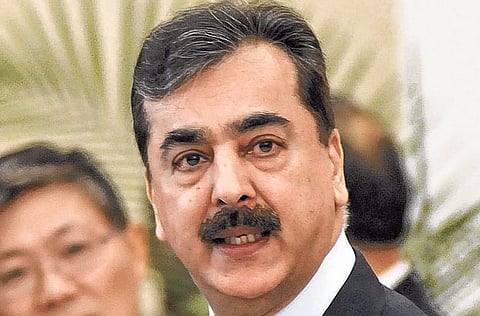Pakistan's future hangs in the balance
The ruling camp will go down simply because it has failed to instil confidence among the common people

Pakistan's Prime Minister Yousuf Raza Gilani's warning last week of a conspiracy under way to topple his democratic government comes with a barely half-convincing ring. Gilani's government, now in its fourth year in office, is indeed surrounded by widespread concern over its inability to successfully complete its tenure which is due to end in early 2013.
Though the prime minister did not specifically point towards the army's involvement in efforts to destabilise the ruling structure, he did say that the army must be accountable to parliament and cannot operate as a state within a state.
It is hardly surprising that Gilani has chosen to talk tough at this difficult time in Pakistan's history, when his popularly elected government is the butt of equally popular jokes.
Looking back over the government's tenure, which began after elections in early 2008, Pakistan's ruling structure has little to show for beginning to tackle the toughest challenges surrounding the country, ranging from a tough security environment to a dismally performing economy.
Internal controversies
Almost four years after the elections of 2008 brought the ruling coalition government to power, Pakistan continues to reel under the pressure of internal controversies within the ruling structure. Corruption among the top elite has increasingly become a fact of daily life and appears to be something that is taken for granted.
While Pakistan's prime minister has chosen to point a finger towards the so called "undemocratic" characters in the country who, according to him, are seeking to harm democracy, he appears to have barely taken note of the many inadequacies within the ruling camp.
The matter of Pakistan's economy must be assessed comprehensively before taking a credible view of where the government stands on this and other issues. Indeed, the issue of bread and butter is central to the way in which ordinary Pakistanis will eventually size up their rulers.
For the moment, the government does not have any good news to offer to its constituents. In addition to chronic unemployment and loss of physical safety, which in turn has discouraged new investors, Pakistan also faces the challenge of setting right its public sector companies.
These companies continue to be a major drain on the economy as it is hard to find one which is running in profit. For the public at large, essential services such as the railways, electricity and gas supply systems have increasingly become dysfunctional, with Gilani and his colleagues failing to set them right. To make matters worse, the government's failure to reduce unnecessary spending has essentially meant that it cannot spare added resources to begin tackling some of the worst socio-economic challenges ever seen in Pakistan's history.
Rampant corruption
Other elements of controversy of course revolve around the failure of the ruling camp to shed the impression of rampant corruption among the top elite. A major embarrassment remains the so- called "Haj scandal", involving large sums of money that was supposedly earned by some in power, by receiving kickbacks on contracts for rental accommodation for Pakistani pilgrims in Makkah.
Similar too is a case where the government has refused to comply with an order of the Supreme Court, requiring it to formally approach the Swiss authorities for a re-opening of cases of corruption against President Asif Ali Zardari.
With such a dismal record, it is not surprising that an increasing number of Pakistanis are turning out to join hands with Imran Khan, the cricket star-turned politician. Today, Imran is expected to be in Karachi to preside over the largest gathering of his 16-year political career.
The build-up to Imran's Pakistan Tehreek-e-Insaaf (Pakistan Justice Party) in itself is a powerful indicator of the country's changing popular mood. Tired of the options that have long dominated national politics, Pakistanis are increasingly turning to a relatively new but apparently far more credible option. Khan's political stardom has been fuelled by his record of strong public service through moves such as the establishment of a cancer hospital and a university.
For Gilani, far more relevant to the future of his regime must be the erosion surrounding the ruling camp's popular credentials rather than real or imaginary conspiracies.
Eventually, Pakistan's prime minister and the rest of the ruling elite will go down simply because they have failed to give confidence to ordinary Pakistanis, coping with some of the most difficult challenges ever seen in the country's history.
Farhan Bokhari is a Pakistan-based commentator who writes on political and economic matters.



